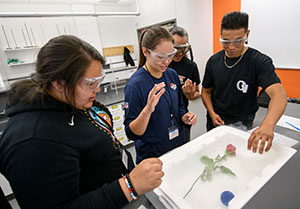UW Professor Collaborates on Diverse Networks in Academic Mentoring Study
Published March 31, 2022

A University of Wyoming professor is among 20 international scholars who recently published a paper on the importance of mentor relationships for women and underrepresented minority scientists in academia.
Bethann Garramon Merkle, an associate professor of practice in the UW Department of Zoology and Physiology, was second author of the paper. She and her colleagues say mentor relationships are crucial to retention, success and well-being of women and underrepresented minority scientists. Specifically, a network of diverse mentors may support long-term career goals and advancement, and retention of both mentors and mentees enhances diversity, equity and inclusion initiatives.
“We have heard calls for fixing the ‘leaky pipeline’ in science and academia for decades,” Garramon Merkle says. “But, a single mentor-mentee relationship can only do so much. The broader issues do not go away just because someone is coached on writing grant proposals, writing papers or getting a job. And, doing that, coaching or mentoring, is a huge commitment -- time, energy, relationship building.”
The international team’s paper, titled “Community voices: the importance of diverse networks in academic mentoring,” was published March 25 in Nature Communications. The entities the authors represent include institutions in Argentina, Brazil, Canada, Chile, China, Ecuador, the Netherlands, the United Kingdom and the U.S.
Garramon Merkle notes these outcomes are closely tied to UW and Wyoming’s economic and educational goals. In Wyoming, she says many college students are first-generation or otherwise need plenty of support. She says UW faculty, staff, instructors and teaching assistants “care enormously” about the success and learning of these students. However, she stresses they also face many constraints.
“Above all, good mentoring is time-intensive, and it is hard to quantify the impacts of mentoring versus more papers published or grants awarded,” Garramon Merkle adds.
In a scan of 27 programs around the world, the paper’s authors found that an ideal framework provides people with multiple mentors. A mentoring network shares the work and provides a broader range of advice and access to more professional contacts. The researchers describe their vision that two things accompany such networks: training for mentors on how to effectively mentor diverse mentees and major investment support from universities and funders.
The authors envision such investments would pay for and reward good mentoring, and hold universities and scientists accountable for better mentoring. Training and accountability are important, the authors say, because effective mentorship goes beyond mere supervision.
“A boss or adviser is not automatically a mentor,” Garramon Merkle clarifies. “Rather, mentors are people who commit to the professional growth of their mentee, regardless of whether this benefits the mentor.”
The authors note this mindset can be challenging, as mentors may not have the same life experiences, goals or professional requirements as their mentees. For example, most UW students will not become academics or even teachers.
“We have a huge responsibility: Advisers and instructors should be able to teach and advise students toward the careers and civic lives they desire,” Garramon Merkle says. “We can do this if we help each other.”
The authors also call for this expanded model because traditional supervisory models do not address key obstacles that women and underrepresented minority groups face during their education. In particular, there is less representation of these demographics at later stages in academic careers.
A lack of diverse mentors at senior career stages means fewer such mentors are available to shoulder the burden of mentoring increasingly diverse undergraduate and early-career scientist populations. The authors suggest that institutions should approach efforts to increase diversity, equity and inclusion (DEI) differently by adding mentoring strategies to increase DEI and promoting multimentor programs.
As an example, Garramon Merkle highlights UW’s own Learning Actively Mentoring Program (LAMP) from the Science Initiative. LAMP connects a cohort of UW and community college faculty and graduate students to a team of mentors for an entire year. The resulting long-term relationships are more feasible because mentoring is shared across the team. This, in turn, leads to a diverse group of people trained in teaching that is more effective.
The research paper’s scholars say that a mentor network also can help overcome the issue of fewer women and underrepresented minority groups in senior positions and increases collective performance by magnifying resources. For example, multiple mentors can share the time commitment of reviewing an application or grant proposal, help a mentee practice for a job interview, or even jointly fund travel to conferences and trainings.
“As we look forward to a new strategic plan for UW, the university’s four pillars relate closely to these recommendations,” Garramon Merkle says. “Indeed, UW aims to be increasingly inclusive, interdisciplinary and entrepreneurial.”
As the paper’s authors note: “A diverse environment improves working and learning experiences for the people involved; brings new perspectives to research; encourages more people to work in STEM fields and academia; and improves opportunities for everyone involved. This nurturing environment also can have a positive impact on productivity and retention of both mentees and their mentors.”
The authors recognize that hard work is necessary to achieve this idealistic vision, Garramon Merkle says.
“Ultimately, enhancing mentoring is worth it,” she adds. “These outcomes are important to the state of Wyoming as we work to diversify our economy and retain the next generation.”

